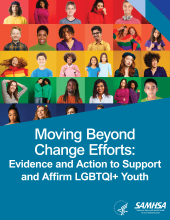Home > PTTC Post Article - June 2023
Author: Cele Fichter-DeSando, MPM
“Like all youth, lesbian, gay, bisexual, transgender, queer, questioning, and intersex youth and other sexual-and gender-diverse children and adolescents (LGBTQI+ youth) deserve to grow up in supportive environments absent stigma and discrimination that allow them to thrive and achieve their human potential. When seeking behavioral health treatment (both mental health and substance use interventions), these children and adolescents, like their peers, and their families deserve the best evidence-based care from knowledgeable health providers without the risk of harm (SAMHSA, 2023) .”
This opening statement from the executive summary of the newly released SAMHSA report Moving Beyond Change Efforts: Evidence and Action to Support and Affirm LGBTQI+ Youth highlights the importance of providing behavioral health providers, educators, researchers, policymakers, and other audiences with current, accurate knowledge about LGBTQI+ youth.
In recognition of Pride Month, the June PTTC Post provides detailed information about this March 2023 report, including the key findings and recommendations.
 The Moving Beyond Change Efforts report is written for multiple audiences and has information and recommendations for behavioral health providers, pediatric and primary care professionals, educators and school professionals, policymakers, and researchers. Resources and support information are also provided for families, parents, caregivers, and community leaders. The report is a comprehensive research overview and provides important information on behavioral health concerns for LGBTQI+ youth along with details on helpful and harmful interventions in clinical, community, family, and school settings. Outlined in the report is a section on understanding sexual orientation and gender identity in children and adolescents and a research overview of the development, behavioral health, and beneficial therapeutic approaches with youth of diverse sexual orientation and/or gender identity.
The Moving Beyond Change Efforts report is written for multiple audiences and has information and recommendations for behavioral health providers, pediatric and primary care professionals, educators and school professionals, policymakers, and researchers. Resources and support information are also provided for families, parents, caregivers, and community leaders. The report is a comprehensive research overview and provides important information on behavioral health concerns for LGBTQI+ youth along with details on helpful and harmful interventions in clinical, community, family, and school settings. Outlined in the report is a section on understanding sexual orientation and gender identity in children and adolescents and a research overview of the development, behavioral health, and beneficial therapeutic approaches with youth of diverse sexual orientation and/or gender identity.
In particular, the report documents that attempts to change an individual’s sexual orientation and gender identity (SOGI; pronounced “SO-gee” change efforts) are harmful and should not be provided.
An estimated 11.4 to 12.2 million adults identify as LGBTQ+ in the United States, a number roughly equivalent to the population of Ohio. An estimated 1.99 million adolescents ages 13 to 17 identify as LGBT in the United States, which is roughly equivalent to the combined populations of Dallas, Texas, and Detroit, Michigan.
As a result of experiencing discrimination, stigma, a lack of awareness, and isolation along with the developmental milestones of adolescence, some LGBTQIA+ youth are at increased risk for experiencing:
Several factors contribute to these inequities and result in minority stress, which is harmful to behavioral health, including:
The key findings and conclusions in the report are based on research and professional consensus statements from a panel of experts in behavioral health, research, education, and policy (The Panel) and include evidence-informed policy options that could improve the overall health and well-being of LGBTQI+ youth.
The Panel reaffirmed that:
The Panel concluded that:
The Panel found that:
The Panel confirmed that:
The Panel determined that:
The Panel recommends approaches that:
The Panel recommends policies that:
At the conclusion of the Moving Beyond Change Efforts Report, SAMHSA states that it is “committed to eliminating health inequities experienced by marginalized communities, including LGBTQI+ youth” and asserts the need for, families, caregivers, providers, and educators to have access to resources and accurate information to inform healthy decision making.
Two key strategies are identified that can help prevent adverse outcomes and support healthy development for LGBTQI+ youth.
Included in the report are a glossary of terms, extensive references, and online and print resources designed for specific populations to help carry out the key strategies.
The report concludes that in order to reduce health inequities and improve the health and well-being of LGBTQI+ youth behavioral health providers, medical health providers, educators and school professionals, community leaders, families, parents, caregivers, and policy-makers must work together to
“Like all youth, lesbian, gay, bisexual, transgender, queer, questioning, and intersex youth and other sexual-and gender-diverse children and adolescents (LGBTQI+ youth) deserve to grow up in supportive environments absent stigma and discrimination that allow them to thrive and achieve their human potential. When seeking behavioral health treatment (both mental health and substance use interventions), these children and adolescents, like their peers, and their families deserve the best evidence-based care from knowledgeable health providers without the risk of harm (SAMHSA, 2023) .”
References
Substance Abuse and Mental Health Services Administration (SAMHSA): Moving
Beyond Change Efforts: Evidence and Action to Support and Affirm LGBTQI+ Youth. SAMHSA Publication No. PEP2203-12-001. Rockville, MD: Center for Substance Abuse Prevention. Substance Abuse and Mental Health Services Administration, 2023. https://store.samhsa.gov/sites/default/files/pep22-03-12-001.pdf